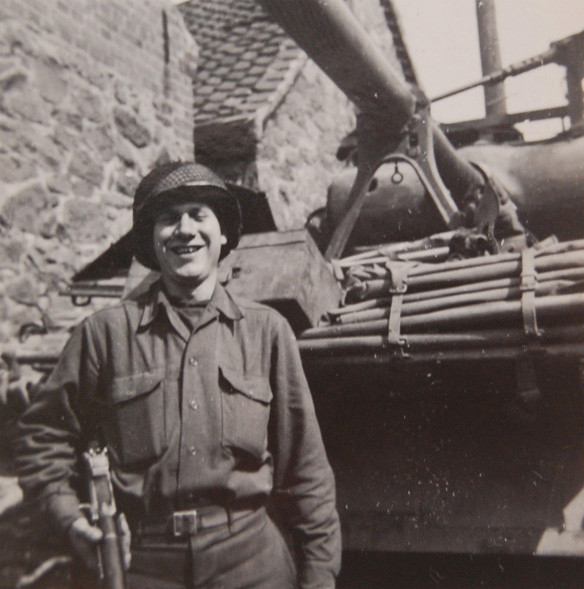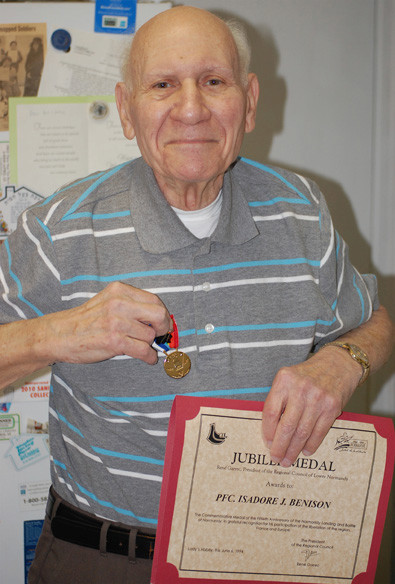Normandy vet gets his due
Sixty-five years after his military service ended, 92-year-old Isadore Benison was honored with a prestigious award for his participation in the battle of Normandy. On Oct. 30, he received the Jubilee of Liberty Medal, awarded to U.S. servicemen who took part in the invasion of France by Allied forces in June of 1944.
Benison, a resident of Valley Stream for more than 30 years, was part of the 654th Tank Destroyer Battle, Company B, fighting in Central Europe, Normandy, Northern France, Ardennes and the Rhineland during his service. He joined the Army on Feb. 3, 1942, and served for three and a half years.
Benison went to Fort Bragg, N.C., for his basic training. He was then sent to Fort Jackson, S.C., and became part of the 30th Division Field Artillery. He remembers the inspector general visiting the base and saying, “My God! This unit is not fit to go anywhere.” His last stop before heading to Europe was Camp Gordon, Ga., where he joined the 654th Battalion. It got its number because its was formed in the sixth month, on the fifth day, from the 4th Division.
In the Normandy invasion, the largest amphibious military operation in history, Benison said he had to wait his turn to go ashore, and did so on the second day at Omaha Beach. His battalion was responsible for bringing much of the equipment to land.
For Benison, Normandy was just the beginning, as he would take part in many battles until the war ended. After the U.S. attack on St. Lo in June 1944, in which it bombed German fortresses, Benison’s battalion was activated and went forward. They liberated the city of Orleans.
He was in the middle of France when his battalion received word that the Germans had attacked Belgium, igniting the Battle of the Bulge. Benison and his fellow soldiers drove all night through Luxembourg and into Belgium, stopping only for a short nap in some hay. Then, in their battle with the Germans, 10 of his buddies died and two tanks were destroyed.

In the last push of the war, Benison was transferred to the 9th Army. At the Rhine Crossing, the Navy was laying a bridge across the river — wider than the Hudson, Benison said — so the Army could get its equipment across. Eventually, they began to move across the river with infantrymen stationed every few years to guard them. Soon his unit hit the autobahn and made it to Tarahati at the Elb River, where his battalion was ordered not to go any further.
Benison later learned that they were waiting for the Russian Army to come from the other side. There would be no final battle. “Little did I know at the time, the Germans had to give up,” he said. “The Germans were starting to surrender. I didn’t know the war was over for me.”
Fighting the Germans was tough, he recalled, because they had such good equipment. Benison said that the German cannons and tanks were of the best quality. And it made the war unpredictable. “I didn’t know what the next moment would be,” he said.
Survival wasn’t easy. Benison remembers being in a row of hedges and coming across a garage amid the heavy vines. He leaned on the cement wall of the garage, and shortly afterward the top of the building was hit by two shells. Twenty soldiers from his company were killed. He was lucky.
Another time, he heard the drone of a German airplane and quickly crawled into a hole. A bomb came down and hit the ground. When he crawled out, other soldiers told him how lucky he was. “They told me, ‘The bomb missed you by a couple of yards,’” Benison said.
His military service officially ended on Sept. 16, 1945, when he was honorably discharged.
Benison received numerous medals for his service, including campaign, victory, good conduct, marksman, occupation of Germany and bravery awards. The distinguished medal for bravery, he explained, was not for any specific accomplishment. “For every act,” he said. “I was in every big battle.”

The Jubilee of Liberty Medal was presented to him and nine others by the Long Island Air Force Association on Oct. 30 at the American Air Power Museum in Farmingdale. Benison received a congressional citation from U.S. Rep Steve Israel as well as one from Valley Stream; village Deputy Mayor Joanne Antun attended the ceremony.
Benison said he felt honored to receive the medal, but that it was not just for him. “I said to myself, ‘I’m a survivor,’ and my buddies who died in the battles, they deserve the medal and they’re not here to get it.”
After the war, Benison worked for the U.S. Postal Service. He was a clerk at the General Post Office at 33rd Street and 8th Avenue in Manhattan, retiring in 1981. He was married for 62 years to Claire Kate Benison, who died two years ago. They had three sons, Melvin, Harvey and Allan, and six grandchildren.
Benison was born in East Harlem, and was living in the Bronx when he was called into duty not long after the Japanese attack on Pearl Harbor. He lived in Far Rockaway before settling in Valley Stream.
He said that only one out of every 10 people who join the Army actually fight in combat. The rest provide support services. He said he is proud to have been part of the 10 percent, and just as proud to be recognized for his service, even if it was 66 years later. “I earned it,” he said. “Every man that was in my company earned it.”
Reflecting on his military career, Benison said he is proud that he can still tell his stories from memory.
There are still about 2 million World War II veterans alive today, out of more than 16 million who served in the armed forces during the war. “I think of my buddies who fought with me and aren’t here,” he said. “I’m 92 years old. How many of us are left now?”









